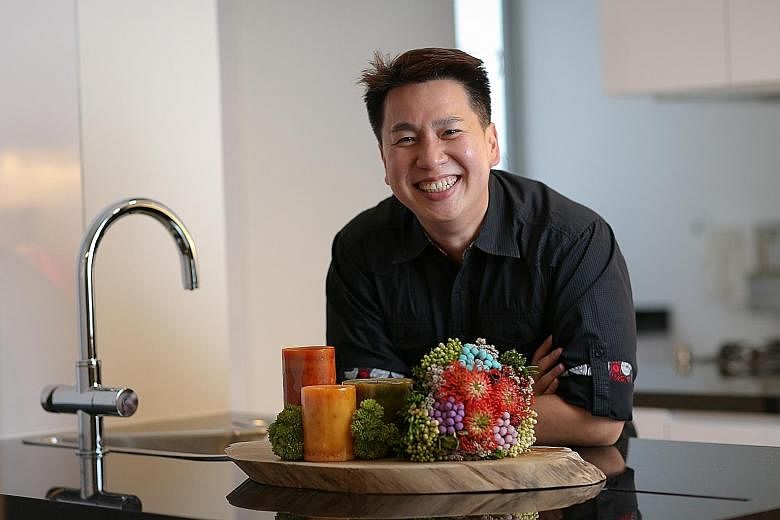Former remisier Collin Seow was only six months into his new job and expecting his second child in 2007 when he encountered a major obstacle.
His second biggest client had lost $200,000 in a trade and defaulted on the payment by declaring bankruptcy. That left Mr Seow, 44, with a debt of $250,000, including interest owing to his brokerage, so he took a drastic option and worked to turn his life around.
The trader - who was putting money in everything from coffee to indices - systematised his methods to make winning bets and pay off his debts.
He devised a unique process - one that used logic to write codes that would follow a stock closely, study its trajectory and present investors with a scenario on its possible movements.
The Systematic TradersGPS, as it is known, proved to be so successful that Mr Seow not only paid off his debt, but also impressed his employers. They invited him to share his methods at events and talks.
Now the certified financial technician not only trades but also imparts his knowledge through public speaking and training.
His methods have been adopted by many over the past 11 years, and they have formed a community to discuss their trades and seek advice and support from each other.
"Teaching the correct trading psychology is more important than teaching technical analysis for trades," says Mr Seow, who feels the community is a network which helps each member keep his emotions aside and do what is right in a trade.
While he no longer works as a full-time broker, Mr Seow has continued investing for himself and conducting training. He is also an angel investor, pouring in capital in many promising new companies that have unique ideas that could translate to successful ventures.
Mr Seow is founder and chief executive of SF5, which runs The Systematic Trader Programme to equip the public and finance professionals with trading and investment strategies.
His wife Shamaine Seah, 44, is a housewife and they have three children, aged eight, 10 and 13.
-
Worst and best bets
-
Q What has been your biggest investing mistake?
A I was in Hong Kong for a holiday with my family in 2011, when I was still working at a trader. Usually, when I went for holidays, I would close off all my positions in the equity market. But this time, I took a long-term trading position on this particular trade. As the prices went down, my loss was more than $200,000.
But I don't see mistakes as permanent; I see them as a learning curve.
Q What has been your best investment decision?
A My best investment decision was to attend a course called Excellerated Business School for Entrepreneurs - an experimental learning programme for young entrepreneurs. It was an eight-day course that cost me around $8,000. It helped me realise my potential, and that my purpose in life goes beyond serving myself.
I have attended many other courses in my life, and I am a firm believer that the best investment in your life is education, which pays for itself over a lifetime.
Q Moneywise, how were your growing-up years?
A I come from a poor family. My dad worked various jobs such as forklift driver, parking valet and chauffeur, while my mum worked as a seamstress and a maid. I myself started working when in Primary 5, selling toothpaste and shampoo door-to-door with my little sister in tow.
There were a lot of things we could not afford. For instance, one Chinese New Year, we had to walk to visit relatives because mum did not have the money to take a taxi. Apparently, I was crying and so was my sister - completely overwhelming my mother. This story has been deeply imprinted in my mind, and has helped me understand the importance of money and, more importantly, the pain caused by the lack of it.
Q How did you get interested in investing?
A I was always interested in investing, and I realised this in my teenage years when I worked odd jobs like waiting on customers at a fast-food joint or working as a security guard.
Back then, after saving up a small amount of money, I took the initiative to look for a financial adviser to help me invest the capital. Unfortunately, I got the wrong advice and ended up investing in the wrong instruments and lost it all. This made me want to learn even more about investing and trading.
My first exposure to trading was when I learnt technical analysis at a "bucket shop" at the White House, which is now called the Maxwell Chambers. I read any books I could get my hands on about investing. I have modelled myself after financial guru Warren Buffett - the best in the field - and adopted his ideas.
Q Describe your investing strategy.
A Some people are technical analysts, and some believe in value investing. I have a very unique style of investing.
Instead of "buy low, sell high", my theory is to buy strong, sell weak. For example, if we know that interest rates are rising in the long term, we should look at buying bank stocks - where their net interest margins will increase.
I developed my own trading system called the TradersGPS, which I teach in a course called The Systematic Trader. Using a systematic way of comparing the strength of each stock versus the index, I was able to select the strongest stock to buy and weakest stocks to short.
The system will also tell me the exact date and price to enter and exit the stock. This is a back-tested system which performed very well for me over the last 11 years.
I also have full-time employees and several part-time programmers to manage this part of my trading, where they actually develop robots to trade mainly the major indexes and in foreign exchange. They look for patterns in the market that are recurring and predictable, and use the software to back-test their theories on investment.
Q What's in your portfolio?
A I have about $300,000 to $500,000 in equities, indexes and forex. I also have invested in insurance policies that will fetch me more than a million at maturity. Besides, I own a condominium apartment in East Coast.
I am also an angel investor to a few companies. I like to be hands-on with these investments and like to meet those running the firms regularly to mentor them or just bounce ideas with them. I know of angel investors who invest in 30 to 40 companies who treat them more like stocks which don't need much involvement after they invest.
Q What do you think of the current market?
A I am conservative now as I think the market is priced for perfection. I think one should never put all one's liquid assets into the market, as one can never know which way the market will turn.
Q What does money mean to you?
A Money is not like rain, which you can collect in a container and hoard. It is more like a never-ending river, and if you channel it well, more will flow your way. The bigger your heart, the more you will be blessed. The more you give, the more you will have to give. Money should go beyond your personal need and comfort for it to make sense.
Q What are your immediate investment plans?
A I have moved beyond just the regular investment in stocks and timing of the market. Instead of spending time and money investing/trading in the market, I am investing money to develop robots and algorithms that trade the market. I will set aside some funds to grow my investment team to become a proprietary trading desk for robots and artificial intelligence.
Instead of buying stocks to get a dividend, I invest in private companies that will make a difference - like financial technology companies.
Q How are you planning for retirement?
A I have more than $1 million in life insurance but I don't intend to retire. I want to work till I die.
Personally though, I have enough passive income now to last a lifetime but that is not important. Recently, I just took my whole family of five to Norway and Sweden to see the Northern Lights and for hiking. My wife commented that she knows how much I missed work. Yes, I prefer working, meeting people, making a difference in people's lives than just "enjoying" my life.
Q Home is now..
A A condo unit in the East Coast.
Q I drive...
A Our family car is a Honda Vezel but I prefer not to drive for personal work. I take a taxi or book a car through ride-sharing apps. It's like having a chauffeur on demand. Also, I have been thinking of buying a vintage car for about a year now but haven't decided to go ahead yet.


